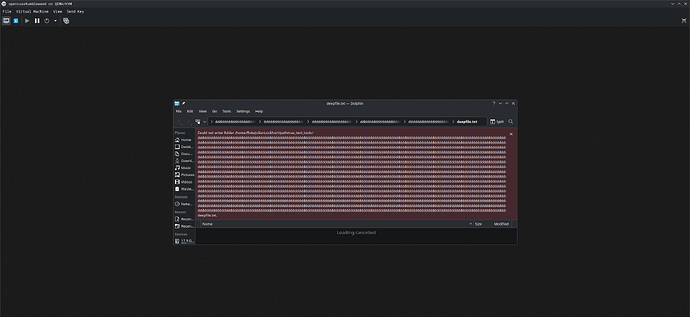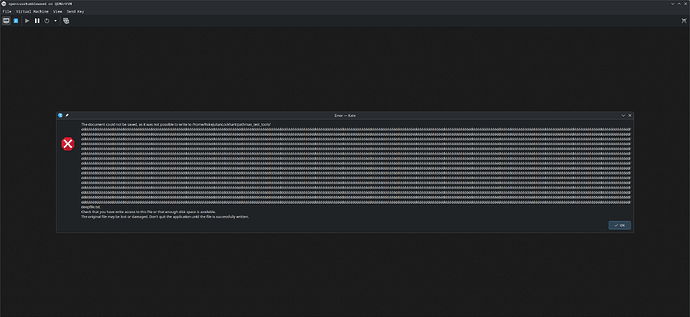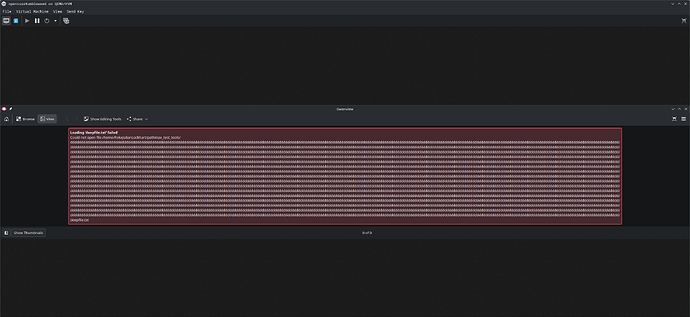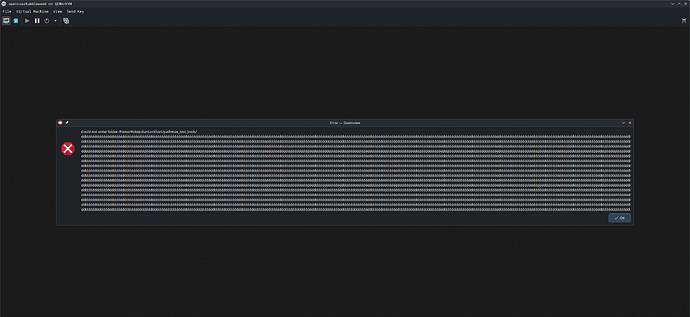Context
If one creates a directory whose absolute path is > [1] PATH_MAX’s 4096 default: [2]
-
Creation
#!/usr/bin/env python3 import os import subprocess import shutil from datetime import datetime # Configuration base = os.path.expanduser('~/pathmax_tool_test') name = 'd' * 255 log_path = os.path.join(base, 'tool_results.log') content = 'This file is deeper than PATH_MAX.\nIt contains real content.\n' tools = [ ['ls', '-ld'], ['realpath'], ['file'], ['readlink', '-f'], ['stat'], ['du', '-sh'], ['cat'], ['rm'] ] def log(msg): timestamp = datetime.now().strftime("[%Y-%m-%d %H:%M:%S]") with open(log_path, 'a') as f: f.write(f"{timestamp} {msg}\n") def run_tool(tool, path): try: subprocess.run(tool + [path], check=True, stdout=subprocess.DEVNULL, stderr=subprocess.DEVNULL) log(f"{' '.join(tool)}: success") except subprocess.CalledProcessError as e: result = subprocess.run(tool + [path], stderr=subprocess.PIPE, text=True) log(f"{' '.join(tool)}: failed") log(f" stderr: {result.stderr.strip()}") # Cleanup and setup shutil.rmtree(base, ignore_errors=True) os.makedirs(base) with open(log_path, 'w') as f: f.write("# Tool Results Log\n\n") log("Starting deep path creation...") # Create deep directory using file descriptors fd = os.open(base, os.O_RDONLY) components = [] path_len = len(base) while path_len <= 4096: os.mkdir(name, dir_fd=fd) fd = os.open(name, os.O_RDONLY, dir_fd=fd) components.append(name) path_len += len(name) + 1 # account for slash full_path = os.path.join(base, *components, 'deepfile.txt') log(f"Created path: {full_path}") log(f"Path length: {len(full_path)}") # Create and write to the deep file file_fd = os.open("deepfile.txt", os.O_CREAT | os.O_WRONLY, 0o600, dir_fd=fd) os.write(file_fd, content.encode('utf-8')) os.close(file_fd) log("Wrote content to deepfile.txt") # Read back the content using file descriptor fd_read = os.open("deepfile.txt", os.O_RDONLY, dir_fd=fd) read_content = os.read(fd_read, 1024).decode('utf-8') os.close(fd_read) log("Read back content:") for line in read_content.strip().splitlines(): log(f" {line}") # Run tools and log results log("\n=== Tool Compatibility Check ===") for tool in tools: run_tool(tool, full_path) # Save full path for external reference with open(os.path.join(base, 'full_path.txt'), 'w') as f: f.write(full_path + '\n') log("Finished all checks.") print(f"\nDone. See log at: {log_path}")Something in that calls
file, which returns:deepfile.txt: ERROR: Output buffer space exceeded 4186+0Ignore it. IDK what’s calling it. It’s separate to
MAX_PATHanyway, since it appears to indicate that a buffer internal tofileis overflown. -
Confirmation
I’ve confirmed that this actually works:
-
I wrote to it:
#!/usr/bin/env python3 import os base = os.path.expanduser('~/pathmax_tool_test') segment = 'd' * 255 target_file = 'deepfile.txt' content = b'Hello from the deep!\n' # Start from the base directory fd = os.open(base, os.O_RDONLY) try: for _ in range(100): # reasonable max depth cap try: # Try to descend into next subdirectory next_fd = os.open(segment, os.O_RDONLY, dir_fd=fd) os.close(fd) fd = next_fd except FileNotFoundError: break # No more levels # Now we're at the deepest level, write the file here file_fd = os.open(target_file, os.O_WRONLY | os.O_CREAT | os.O_TRUNC, 0o644, dir_fd=fd) os.write(file_fd, content) os.close(file_fd) print("Wrote to deepfile.txt at deepest level.") finally: try: os.close(fd) except: pass -
I read from it:
#!/usr/bin/env python3 import os base = os.path.expanduser('~/pathmax_tool_test') segment = 'd' * 255 target_file = 'deepfile.txt' def walk_fd_to_file(base_dir, segment_name, target_file): """ Walks down segment_name subdirectories using file descriptors until target_file is found. Returns the file content as a string. """ print(f"Starting from base: {base_dir}") fd = os.open(base_dir, os.O_RDONLY) try: for depth in range(100): # Limit to prevent infinite loops try: file_fd = os.open(target_file, os.O_RDONLY, dir_fd=fd) print(f"Found '{target_file}' at depth {depth}") content = os.read(file_fd, 4096).decode('utf-8', errors='replace') os.close(file_fd) return content except FileNotFoundError: # Not here yet, try next subdirectory try: next_fd = os.open(segment_name, os.O_RDONLY, dir_fd=fd) os.close(fd) fd = next_fd except FileNotFoundError: raise FileNotFoundError(f"Directory segment '{segment_name}' not found at depth {depth}") raise RuntimeError(f"Reached max depth without finding '{target_file}'") finally: try: os.close(fd) except: pass # ---- Main usage ---- if __name__ == '__main__': try: file_content = walk_fd_to_file(base, segment, target_file) print("\nFile content:\n") print(file_content) except Exception as e: print(f"Error: {e}")
-
…Dolphin merely pretends that it has no children, and fails to open its child directory if it is manually entered:
This reminds me of what occurs when Windows’s MAX_PATH is exceeded:
This is, unfortunately, the best behaviour of any KDE application.
If, inside that directory, is a file of text/plain, when passed as an argument, Kate considers invokes a small “New file” notification in its GUI. Additionally, it fails to save it, with an erroneous message that the file may be corrupt:
Gwenview and Okular fail even to open it:
Question
What library and/or function do all these applications call to open and save these? Perhaps, better yet, might I be able to easily ascertain with something like strace?




